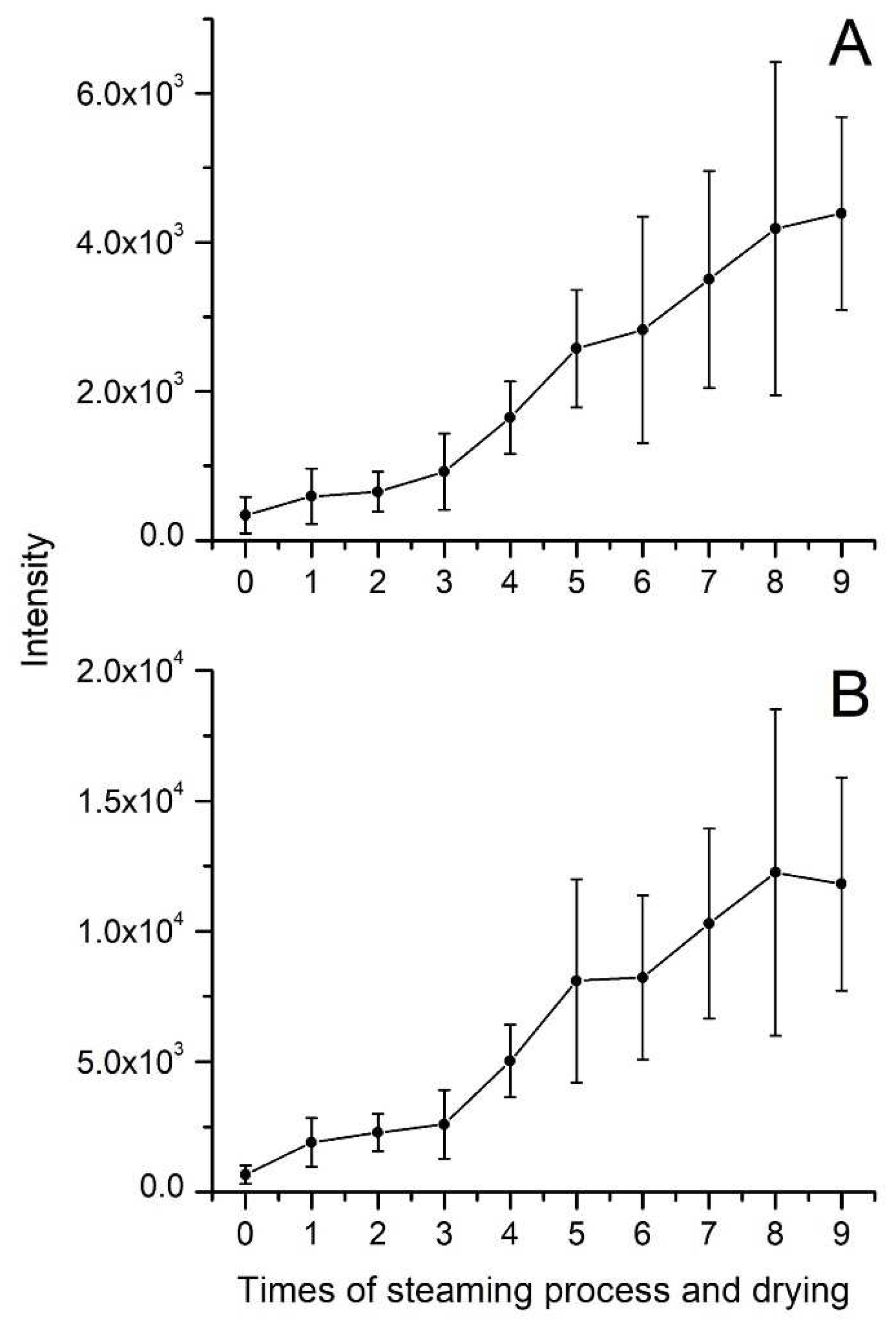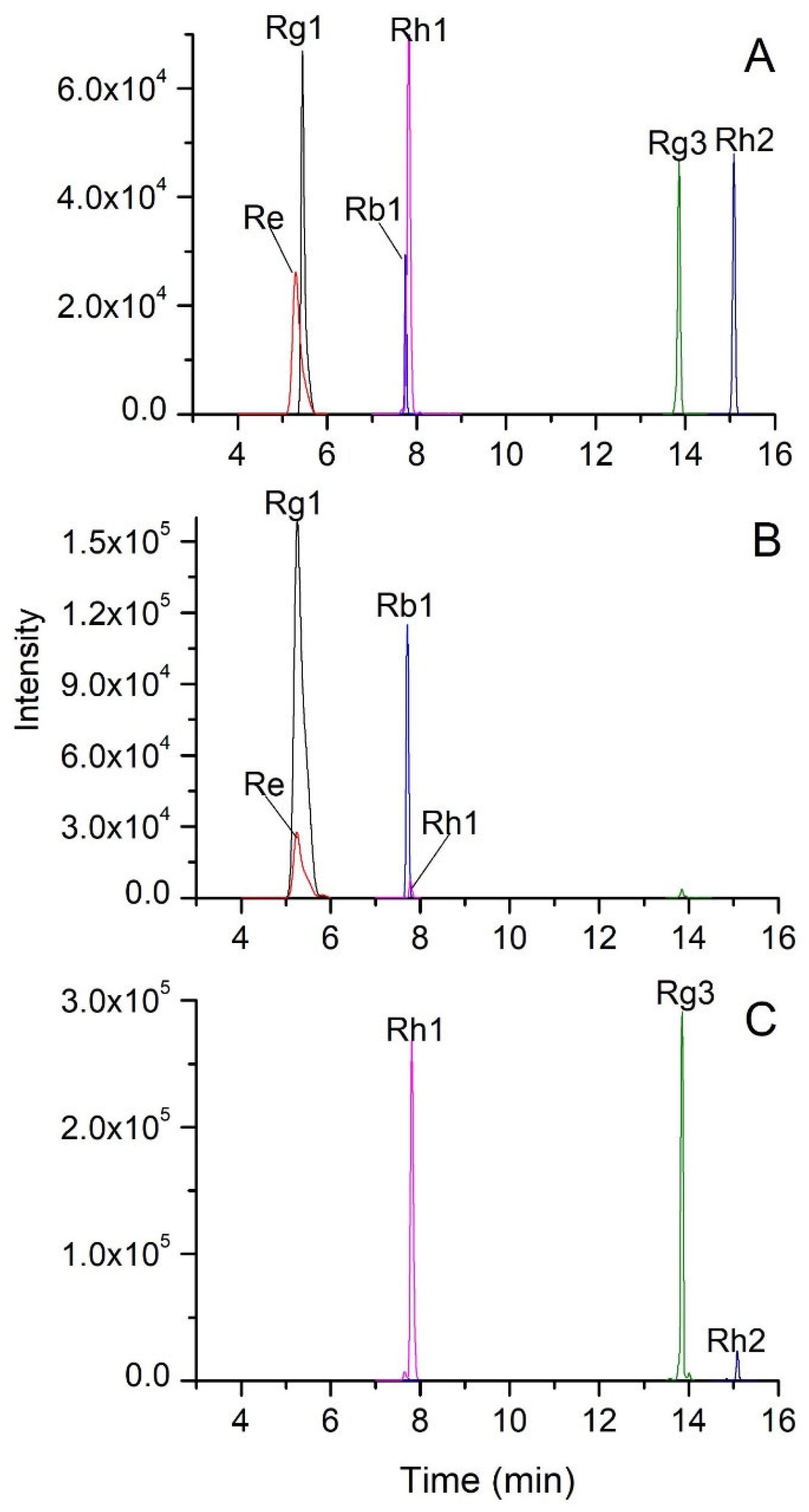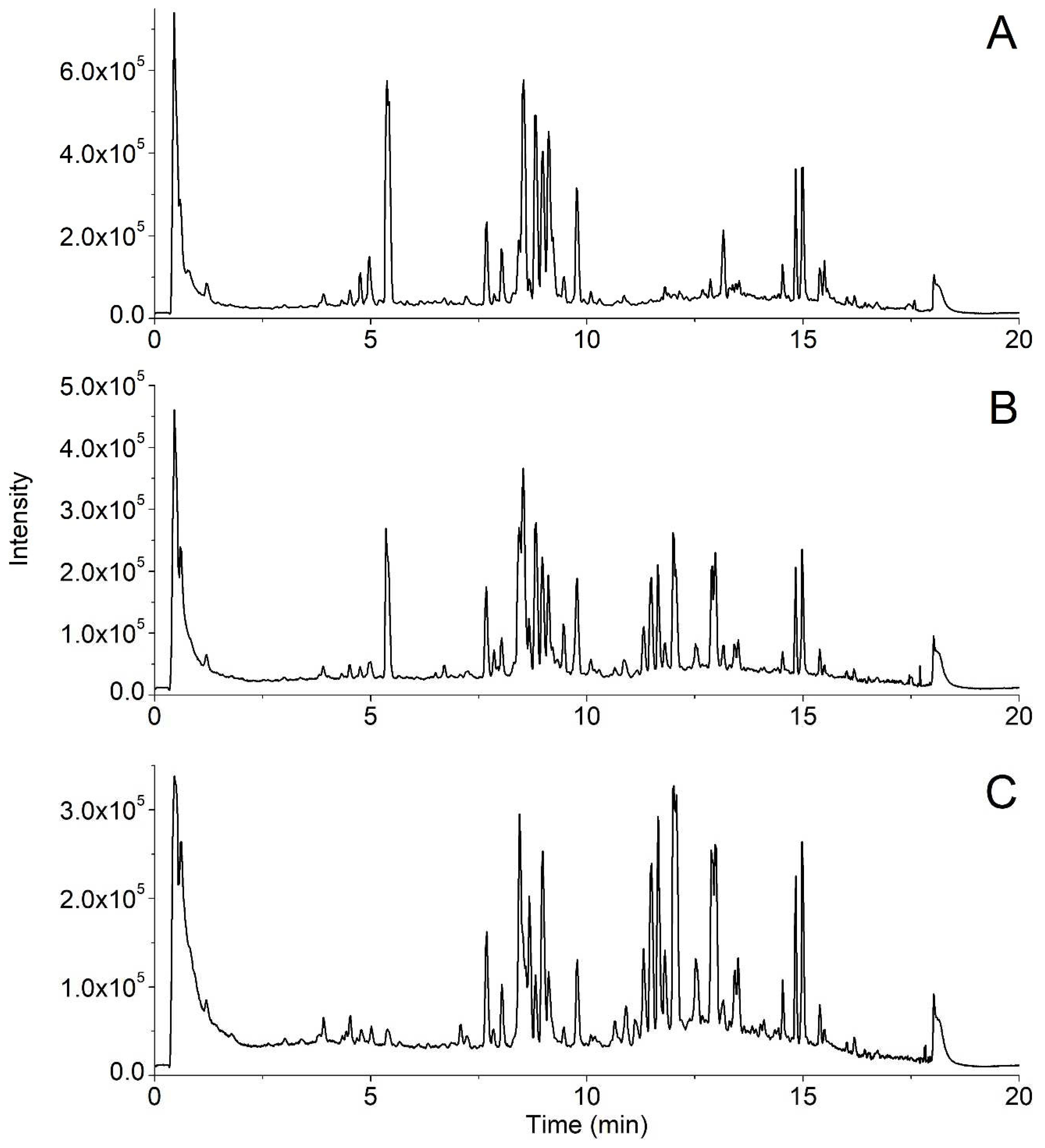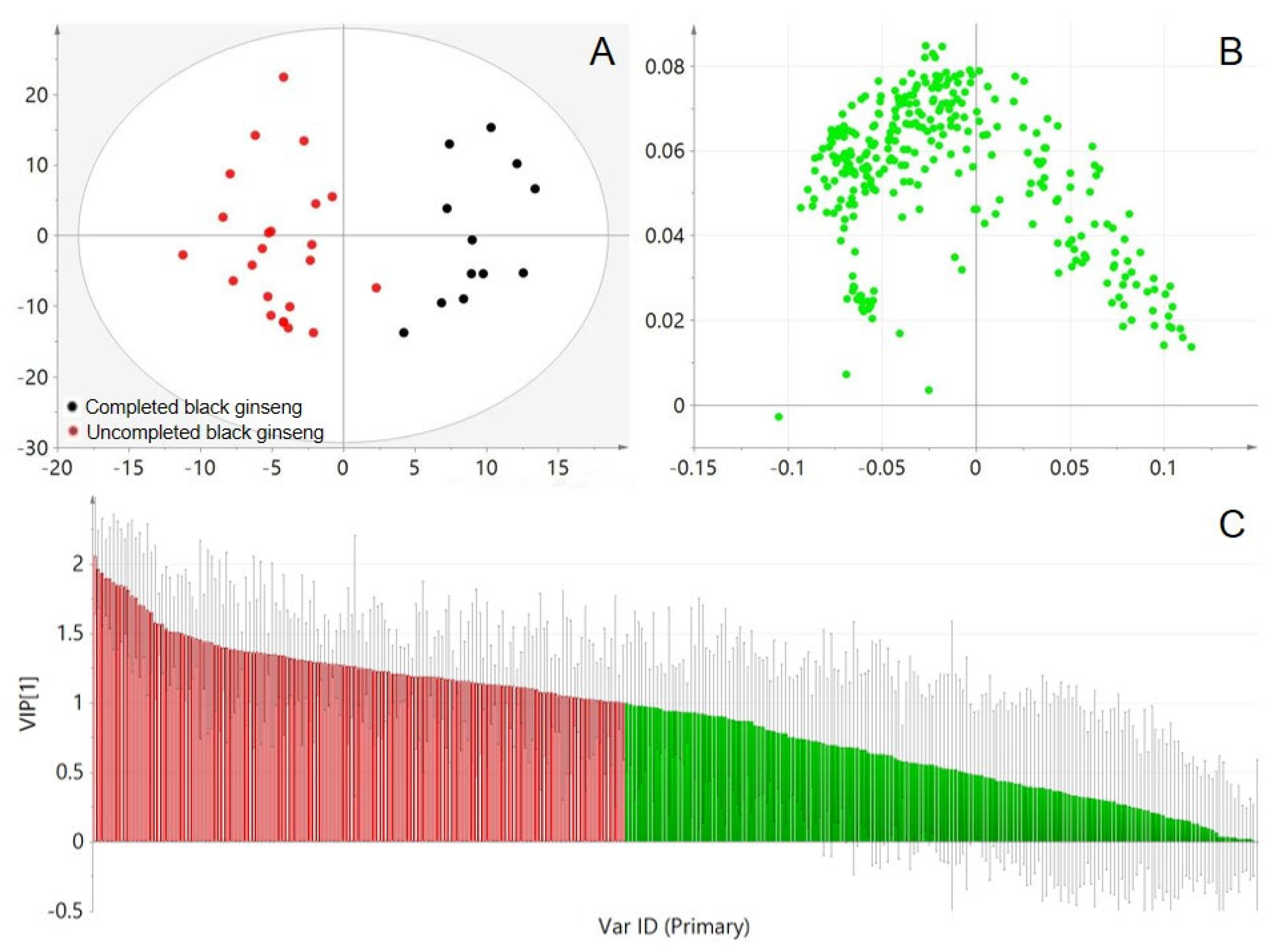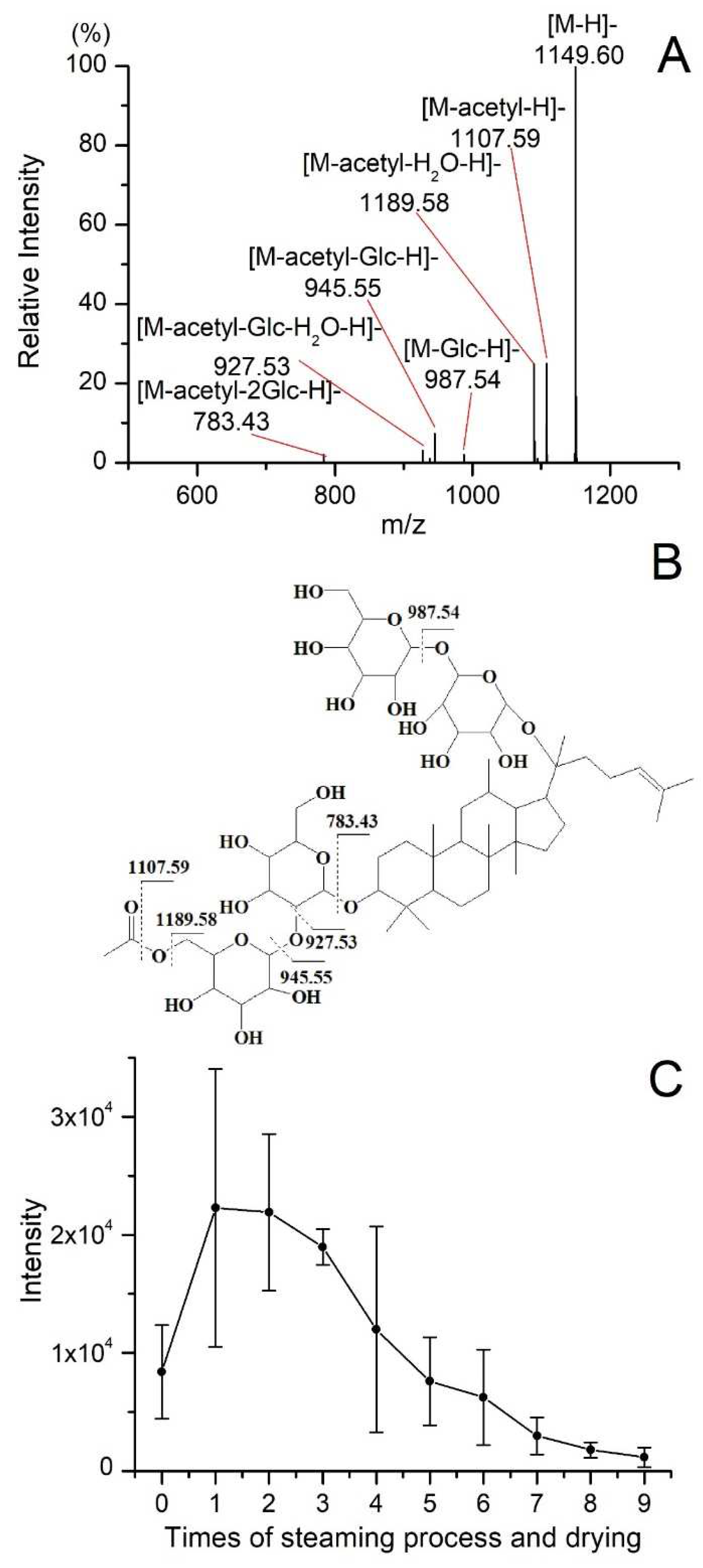1. Introduction
Ginseng is the roots and rhizomes of
Panax ginseng C.A. Meyer and has been widely used as an herbal remedy or tonic food in China, Korea, and Japan for thousands of years to adjust the balance of the human body [
1,
2,
3]. Processing plays a crucial role in the utilization of herbal medicines in traditional Chinese medicine. In the commercial market, ginseng is commonly sold in two forms: white and red ginseng. The white ginseng is produced by drying fresh ginseng in the sun after basic cleaning and the red ginseng is manufactured by steaming fresh ginseng one time. Traditionally, white ginseng and red ginseng are generally used. Black ginseng is a new type of processed ginseng, which exhibits more potent biological activities than the two traditional processed products [
4]. Black ginseng is also available and is typically produced by steaming fresh or white ginseng at 96 ℃ for three hours, followed by hot air-drying, and then repeated above operation nine times [
5,
6,
7]. Other methods have also been reported in the preparation of black ginseng, such as steaming the white ginseng at 113.04 ℃ for 18 h and drying at 100 ◦C for 8.03 h [
8]. According to previous reports, black ginseng exhibits anticancer, hepatoprotective, antidiabetic, anti-obesity, antioxidant, and anti-inflammatory pharmacological activities [
9,
10,
11,
12,
13,
14].
Some reports indicated that the main bioactive secondary metabolites of ginseng are ginsenosides [
15,
16]. With respect to the structural characteristics of aglycone, ginsenosides can be classified into three major classes: protopanaxadiols (PPDs) and protopanaxatriols (PPTs), and oleanolic acid type [
17]. In addition, other classes have been reported in ginseng, such as malonyl-ginsenoside and acetyl-ginsenoside [
18,
19]. During the steaming process of black ginseng, certain ginsenosides undergo various chemical reactions and are converted into different compounds. Specifically, the polar ginsenosides undergo hydrolysis, dehydration, decarboxylation, and isomerization reactions at C-3, C-6, or C-20, resulting in the formation of specific less-polar ginsenosides [
7,
20]. Some works have been reported and aimed to study the transformation of ginsenosides [
4,
21,
22,
23]. The changes in the chemical composition of black ginseng will significantly affect its biological activity, pharmacological effects, and clinical applications. However, relatively less effort has been devoted to studying the chemical differentiation between black ginseng with different processing levels. Therefore, it is an urgent need to develop a quantitative analysis method and explore analytical markers of black ginseng, which is beneficial for quality control of black ginseng.
Innovative approaches utilizing LC-MS and multivariate statistical analysis (MSA) have proven successful in exploring analytical markers and evaluating the quality of traditional Chinese herbal medicine [
24]. In this study, an ultra-high-performance liquid chromatography-triple quadrupole/mass spectrometry (UPLC-QQQ/MS) method was developed to precisely quantify six ginsenosides in white and black ginseng. Based on the quantitative results, the black ginseng samples were categorized into two groups: incomplete and complete black ginseng. Subsequently, the ultra-high-performance liquid chromatography-quadrupole-time of flight/mass spectrometry (UPLC-Q-TOF/MS) technique was employed in conjunction with MSA to investigate the differences between the two groups and select the analytical markers of black ginseng.
2. Results and Discussions
2.1. Optimization of UPLC-QQQ/MS Conditions
Figure 1(A) displays the chromatogram of six ginsenoside standards obtained through UPLC-QQQ/MS utilizing MRM mode. The ion pairs utilized for quantitative analysis were optimized. Typically, the precursor ion was the base peak in the MS spectra of a compound, while the product ion was selected as the base peak in the MS/MS spectra.
Table 1 showcases all the optimized MRM conditions. The precursor ions were [M-H]- or [M+HCOO]- of ginsenosides, while the selected product ions were [M-H]- of ginsenosides or fragment ions from losing sugar radicals. The optimized collision energy was from 15 to 35 eV. High collision energy would cause the precursor ions to fragment into smaller fragment ions, resulting in a decrease in the signal of the target product ions. Therefore, the best collision voltage used here does not exceed 35eV. Suitable declustering potential is beneficial to the generation of adduct ions (precursor ions) of ginsenoside. And the optimized declustering potential was from -80 to -130 V. All the optimized parameters were used in UPLC-QQQ/MS analysis to quantify the six ginsenosides in white and black ginseng.
2.2. Validation of the Method
Table 2 displays the precision and repeatability of the developed UPLC-QQQ/MS method for quantifying ginsenosides in black ginseng. The precisions for all six ginsenosides ranged from 0.90% to 1.86%, while the repeatability ranged from 1.33% to 3.74%. The LODs and LOQs for the six ginsenosides were in the ranges of 4.0 to 20.4 ng/mL and 8.0 to 51.0 ng/mL, respectively. The regression equation and linear range of ginsenosides are also displayed in
Table 2. The six ginsenosides showed a wide linear range, with Rh2 and Rg3 having a linear range that is 500 times wider. The compounds exhibited good linearity (r≥0.99) and a concentration range of up to 2 orders of magnitude, indicating the method's capability to quantify the ginsenosides. The recoveries ranged from 86.16% to 112.39%, as presented in
Table 2. The validation results of the method indicated that the developed UPLC-QQQ/MS method has low LODs and LOQs, excellent precision, repeatability, and accuracy. This method can be effectively utilized to quantify the six ginsenosides present in black ginseng samples.
2.3. Content determination of six ginsenosides in black ginseng
The content of six ginsenosides in white and black ginseng was detected using the developed UPLC-QQQ/MS method. The quantitative results of six ginsenosides were shown in
Table 3. And the results illustrate that the content of all the six ginsenosides changed significantly during the processing of black ginseng. The content of polar ginsenoside Re, Rg1, and Rb1 decreased significantly with the increase in processing times and began to stabilize from the seventh processing. On the contrary, the content of less-polar ginsenoside Rh1, Rh2, and Rg3 increased significantly with the increase in processing times and changed a little after the seventh processing. Therefore, the processing of black ginseng tends to finish after seven cycles of steaming and drying. The black ginseng samples were divided into two groups in the next section, one group is incomplete black ginseng (less than 7 cycles of steaming and drying), and the other group is complete black ginseng (7 or more than 7 cycles of steaming and drying). According to the report, the common chemical change of ginsenosides is the predominance of Rg3, and the Rg3 content of complete black ginseng is more than 1 mg/g [
4]. Our experimental results were consistent with the above-mentioned literature. The black ginseng samples which were processed 7 cycles of steaming and drying conformed to the standard. In addition, the content of Rg3 in all complete black ginseng (7 or more than 7 cycles of steaming and drying) exceeded 1 mg/g. The results indirectly supported the classification of black ginseng samples into two groups based on the number of times they have been processed, namely, incomplete and complete black ginseng.
2.4. Exploring of chemical markers of black ginseng based on multivariate statistical analysis
The established UPLC-Q-TOF/MS method was used to compare the chemical profiles of white and black ginseng samples (
Figure 2). Differences between incomplete and complete black ginseng were observed in their total ion chromatograms (TIC). Compared with the incomplete black ginseng, the relative height of the chromatographic peak of ginsenosides with short retention time and high polarity in complete black ginseng was decreased, while the relative height of the chromatographic peak of ginsenosides with long retention time and low polarity was increased. MSA was applied to display intergroup differences. After peak extraction, a dataset containing information on 309 ions was generated. An OPLS-DA pattern was built using the data of black ginseng samples. As shown in
Figure 3A, all samples were within the Hotelling T2 (0.95) ellipse, and distinct differentiation between incomplete and complete black ginseng suggests variations in constituent composition.
To identify the key chemical components responsible for distinguishing between incomplete and complete black ginseng, the OPLS-DA was used to generate a loading plot (
Figure 3B) and VIP plot (
Figure 3C). The loading plot displays each detected component in the black ginseng samples, with those further from the origin contributing more strongly to discrimination. The features with VIP1 large than 1 were selected initially as important analytical markers, which were then further screened using Student's t-test to identify components with significant differences between the two groups. Ultimately, 141 ions with p < 0.05 were kept as the analytical markers, which are highlighted in red in the VIP plot.
Analytical markers were identified by matching accurate m/z and MS/MS information from standard references or literature [
15,
18,
19]. Quinquenoside R1, tentatively annotated without a standard reference, was used as an example to demonstrate identification procedures. The [M+HCOO]
- ion of Quinquenoside R1 at m/z 1195.61 was selected as a precursor ion. As shown in
Figure 4A, the product ion with the highest signal intensity (m/z 1149.60) results from the loss of HCOOH. And product ions at m/z 1107.59, 1089.58, 987.54, 945.55, 927.53, and 783.43, corresponding to the loss of acetyl or glucose radicals, respectively. Except for the ion m/z 987.54, all the other fragment ions are products obtained from the loss of acetyl from the precursor ion, and the possible fragmentation pathways for the product ions are shown in
Figure 4B. A total of 45 analytical markers were tentatively annotated by examining their MS spectra and MS/MS fragmentation patterns, as summarized in
Table 4. As shown in
Table 4, during the process of processing incomplete black ginseng into complete black ginseng, 25 of the 45 analytical markers showed an increase in content, while 20 compounds showed a decrease in content. The retention times of the 25 compounds with increased content were in the range of 4.40 to 14.75 minutes, with a molecular weight range of 460.3916 - 908.4981 Da, while the retention times of the 20 ginsenosides with decreased relative content were in the range of 4.41 to 10.91 minutes, with a molecular weight range of 800.4922 - 1240.6452 Da. Overall, compared to ginsenosides with decreased content, ginsenosides with increased content generally had longer retention time and smaller molecular weight, showing smaller polarity. The changes in ginsenosides of black ginseng significantly affect its biological activity and pharmacological effects. Our experimental results partially explain why black ginseng has better pharmacological effects in terms of anticancer, hepatoprotective, antidiabetic, anti-obesity, antioxidant, and anti-inflammatory.
Quinquenoside R1 is an acetylated ginsenoside, and the variation of its content in processing is different from other polar or less-polar ginsenosides. As shown in
Figure 4C, the intensity of quinquenoside R1 increased significantly during the first steaming and drying. Then, the intensity of quinquenoside R1 decreased from the second cycle to the last one. The quinquenoside R1 could results from that ginsenoside mRb1 lost CO
2 at its malonyl, which could explain the increase of quinquenoside R1 during the first cycle. However, as a polar ginsenoside, the quinquenoside R1 transformed into specific less-polar ginsenosides by hydrolysis, dehydration, decarboxylation, and isomerization reactions during the cycles of steaming and drying. Under the combined effect of the aforementioned factors, the variation of quinquenoside R1 content is different from other polar or less-polar ginsenosides. In addition, the variation of some other acetylated ginsenosides, including 6'-O-acetyl-Rg1, 6'-O-acetyl-Re, yesanchinoside D, Rs1, and Rs2, is similar to quinquenoside R1 during the processing of black ginseng. In addition to ginsenosides, the processing also affects the intensity of aglycones. As illustrated in
Figure 5, the intensity of both 20(S)-protopanaxadiol (PPD) and 20(S)-protopanaxatriol (PPT) increased during the steaming and drying cycles. PPD and PPT are the final metabolites of protopanaxadiol-type and protopanaxatriol-type ginsenosides, respectively, and have a broad spectrum of bioactive effects on the human body [
25,
26].
Figure 4.
The variation of intensity of protopanaxadiol (A) and protopanaxatriol (B) during the processing of black ginseng.
Figure 4.
The variation of intensity of protopanaxadiol (A) and protopanaxatriol (B) during the processing of black ginseng.
3. Materials and Methods
3.1. Chemical reagents and materials
HPLC-grade acetonitrile, methanol, and formic acid were procured from TEDIA (Fairfield, OH, USA), while ultra-pure water was obtained using the Milli-Q water purification system (Millipore, Bedford, USA). The ginsenoside Rb1, ginsenoside Re, ginsenoside Rg1, ginsenoside Rh1, ginsenoside Rh2, and ginsenoside Rg3 standards (abbreviated as Rb1, Re, Rg1, Rh1, Rh2, and Rg3, respectively, in the subsequent sections) were got from Chengdu Must Co. (purity: 99% HPLC, Chengdu, China). Fresh ginseng (four-year-old cultivation), was purchased from Wanliang market (Jilin, China) in 2021.
3.2. Sample preparation
Accurate weighing and dissolution of standard references (Rb1, Re, Rg1, Rh1, Rh2, and Rg3) in 70% methanol resulted in the preparation of a stock solution. Dilution of the mixed standards' stock solutions to different concentrations using 70% methanol facilitated method validation. All solutions were stored at 4°C after preparation.
Fresh ginseng was washed and dried to get white ginseng. Four batches of black ginseng samples were manufactured by nine-time repeated steaming white ginseng at 98 ℃ for 3 h and drying at 50℃ for 24 h. And a part of the black ginseng samples was retained after each steaming and drying.
One gram of dried white ginseng and black ginseng samples were grounded into powder with a mortar, added 10 ml of 70% methanol aqueous solution. After being ultrasonic extracted for 60 min at room temperature, the extract was filtered through a syringe filter (0.22 μm) and injected directly into the UPLC system.
3.3. Method validation
A quantitative analysis was conducted using an external calibration method. Linear calibration curves were generated by plotting the peak areas of mixed standard solutions against their corresponding concentrations. The limit of detection (LOD) and limit of quantification (LOQ) were determined using a signal-to-noise ratio of 3 and 10, respectively. Precision was evaluated by analyzing the standard solution six times and calculating the relative standard deviation (RSD) of the results. To test repeatability, six independent sample solutions were prepared using the procedures outlined in the previous section. The standard addition method was used to determine the recovery of this method, which was calculated using the following formula:
3.4. UPLC-QQQ/MS analysis
A Shimadzu LC20AD ProminenceTM UPLC system and a Thermo Fisher Golden C18 column (2.1×50 mm, 1.9 μm) maintained at 35℃ was used for chromatographic separation. The 0.1% formic acid in water was used as mobile phase A and the 0.1% formic acid in ACN was used as mobile phase B. The proportion of mobile phase B was as follows: 5% (time is 0 to 1 min), 5–30% (time is 1 to 2 min), 30–40% (time is 2 to 10 min), 40–95% (time is 10 to 14 min), 95–95% (time is 14 to 17 min), followed by a return to 5% at 17.1 min for a 3 min equilibration period. The volume of injection and flow rate were set to 2.0 μL and 0.3 mL/min, respectively.
An AB 3200 MS (SCIEX, Concord, Canada) equipped with an electrospray ionization source was used for QQQ/MS analysis. The MS operated in negative ion mode with the following parameters: source temperature of 500 ℃, ion spray voltage of -4500 V, nebulizer gas (N2) at 50 psi, heater gas (N2) at 50 psi, and curtain gas (N2) at 35 psi.
3.5. UPLC-Q-TOF/MS analysis
The chromatographic separation conditions were identical to those described in section 2.4, with the exception of gradient elution. The mobile phase B was utilized in the following proportions: 15% (time is 0 to 1 min), 15-40% (time is 1 to 10 min), 40-95% (time is 10 to 15 min), 95-95% (time is 15 to 17 min), 95-5% (time is 17 to 17.1 min), followed by a return to 5% at 17.1 min for a 2.9 min equilibration period.
The Q-TOF/MS detection was performed using a Triple-TOF 5600+ MS (SCIEX, Concord, Canada) with an electrospray ionization source. Parameters of MS were set to negative ion mode, with an electrospray ionization source temperature of 500 ℃, an ion spray voltage of -4500 V, and nebulizer gas (N2) at 55 psi, heater gas (N2) at 60 psi, and curtain gas (N2) at 35 psi. The declustering potential was set to 100 V. Full-scan MS data were acquired in TOF/MS mode from m/z 100 to 2000 with a collision energy of 5 eV. MS/MS data were acquired in IDA mode with a collision energy of 35 eV and a rolling collision energy of 15 eV. MS spectra mass range was from m/z 100 to 2000, and the mass range of MS/MS spectra was from m/z 100 to 2000.
3.6. Multivariate statistical analysis
After conducting UPLC-Q-TOF/MS detection, the original data obtained from the white ginseng, black ginseng, and QC samples were processed by MS-DIAL version 4.10 (website:
http://prime.psc.riken.jp/). This included subtraction of background, detection of components, peak alignment, and ion fusion. Peak alignment was performed using a QC data as the reference file with a retention time tolerance of 6 s and an MS tolerance of 10 mDa. Parameters of data collection were set at an MS tolerance of 10 mDa and an MS/MS tolerance of 20 mDa. Parameters of peak detection included a minimum peak intensity of 1000 amplitude.
The resulting dataset, which included m/z values at retention time, normalized intensity, and sample codes, was utilized for MSA. The dataset was saved as .csv files and imported into SIMCA software 13.0 (Umetrics, Umea, Sweden) to perform orthogonal partial least squares-discriminant analysis (OPLS-DA). Ions with variable importance in projection (VIP) 1 values greater than 1 were highlighted in the OPLS-DA model and further filtered by Student's t-test (SPSS19.0, Chicago, IL, USA). Components with p < 0.05 were deemed significant and selected as potential markers in black ginseng.
4. Conclusions
A rapid and reliable method was developed using UPLC-QQQ/MS to simultaneously determine six ginsenosides (Rb1, Re, Rg1, Rh1, Rh2, and Rg3) in black ginseng. Additionally, an approach combining UPLC-Q-TOF/MS with MSA was successfully applied to discover chemical markers of black ginseng. A total of 45 analytical markers were selected and identified by matching accurate m/z and MS/MS information from standard references or literature, their changes during the processing have also been revealed. This approach has great potential for quality assessment of ginseng processing products, which can be further applied to the analysis of traditional Chinese medicine.
Author Contributions
Methodology, K. W; Software, Z. C.; Validation, Y. T.; Resources, Zhao Chen; Data curation, H. Z.; Writing – original draft, L. L.; Writing – review & editing, Y. W.; Supervision, B. F.; Project administration, H. Z. All authors have read and agreed to the published version of the manuscript.
Funding
This research was funded by Science and Technology Project from the Department of Science and Technology of Jilin Province (Grant No. YDZJ202201ZYTS268), Science and Technology Project from the Department of Education of Jilin Province (Grant No. JJKH20220470KJ), and Innovation and Entrepreneurship Project for College Students in Jilin Province (Grant No. S202113706065).
Institutional Review Board Statement
Not applicable.
Informed Consent Statement
Not applicable.
Data Availability Statement
The data presented in this study are available on request from the corresponding author.
Conflicts of Interest
The authors declare no conflict of interest.
Sample Availability
Samples of the compounds are available from the authors.
References
- Liu, C.; Xiao, P. , Recent advances on ginseng research in China. J. Ethnopharmacol. 1992, 36, 27–38. [Google Scholar]
- Liliana, G.; Joana, S. A.; Joana, C.; Mafra, I. , Towards authentication of Korean ginseng-containing foods: Differentiation of five Panax species by a novel diagnostic tool. LWT. 2021, 151, 112211. [Google Scholar]
- Chen, J.; Du, B.; Cai, W.; Xu, B. , Ginsenosides and amino acids in flavored ginseng chips as affected by food formulation and processing technology. LWT. 2015, 62, 517–524. [Google Scholar] [CrossRef]
- Zhu, L.; Luan, X.; Dou, D.; Luqi, H. , Comparative Analysis of Ginsenosides and Oligosaccharides in White Ginseng (WG), red Ginseng (RG) and Black Ginseng (BG). J. Chromatogr. Sci. 2019, 57, 403–410. [Google Scholar] [CrossRef]
- Sun, B. S.; Gu, L. J.; Fang, Z. M.; Wang, C. Y.; Wang, Z. , Determination of 11 Ginsenosides in Black Ginseng Developed from Panax ginseng by High Performance Liquid Chromatography. Food Sci. Biot. 2009, 18, 561–564. [Google Scholar]
- Sun, B. S.; Gu, L. J.; Fang, Z. M. W., Chun yan; Wang, Z.; Lee, M. R.; Li, Z.; Li, J.-J.; Sung, C. K. , Simultaneous quantification of 19 ginsenosides in black ginseng developed from Panax ginseng by HPLC-ELSD. J. Pharmaceut. Biomed. 2009, 50, 15–22. [Google Scholar] [CrossRef] [PubMed]
- Ahmed, M. M.; Zhu, L.; Huang, L.; Dou, D. , Black Ginseng and Its Saponins: Preparation, Phytochemistry and Pharmacological Effects. Molecules 2019, 24, 1856. [Google Scholar]
- Ban, Y. J.; Yang, B. W.; Baik, M. Y.; Hahm, Y. T.; Kim, B. Y. , Optimization of the Manufacturing Process for Black Ginseng. J. Korean Soc. Appl. Bi. 2010, 53, 71–77. [Google Scholar] [CrossRef]
- Lee, M. R.; Kim, B. C.; Kim, R.; Oh, H. I.; Sung, C. K. , Anti-obesity effects of black ginseng extract in high fat diet-fed mice. J. Ginseng Res. 2013, 37, 308–349. [Google Scholar] [CrossRef]
- Hu, J. N.; Liu, Z.; Wang, Z.; Li, X. D.; Zhang, L. X.; Li, W.; Wang, Y. P. , Ameliorative Effects and Possible Molecular Mechanism of Action of Black Ginseng (Panax ginseng) on Acetaminophen-Mediated Liver Injury. Molecules 2017, 22, 664. [Google Scholar] [CrossRef]
- Jin, Y.; Kim, Y. J.; Jeon, J. N.; Wang, C.; Min, J. W.; Noh, H. Y.; Yang, D. C. , Effect of white, red and black ginseng on physicochemical properties and ginsenosides. Plant Food Hum. Nutr. 2015, 70, 141–145. [Google Scholar] [CrossRef]
- Lee, M. R.; Yun, B. S.; Sung, C. K. , Comparative Study of White and Steamed Black Panax ginseng, P. quinquefolium, and P. notoginseng on Cholinesterase Inhibitory and Antioxidative Activity. J. Ginseng Res. 2012, 36, 93–101. [Google Scholar] [CrossRef] [PubMed]
- Lee, Y. Y.; Saba, E.; Irfan, M.; Kim, M.; Chan, J. Y.-L.; Jeon, B. S.; Choi, S. K.; Rhee, M. H. , The anti-inflammatory and anti-nociceptive effects of Korean black ginseng. Phytomedicine 2018, 54, 169–181. [Google Scholar] [CrossRef] [PubMed]
- Seo, Y. S.; Shon, M. Y.; Kong, R.; Kang, O. H.; Zhou, T.; Kim, D. Y.; Kwon, D. Y. , Black ginseng extract exerts anti-hyperglycemic effect via modulation of glucose metabolism in liver and muscle. J. Ethnopharmacol. 2016, 190, 231–240. [Google Scholar] [CrossRef]
- Wu, W.; Song, F.; Guo, D.; Mi, J.; Qin, Q.; Yu, Q.; Liu, S. , Mass Spectrometry-Based Approach in Ginseng Research: A Promising Way to Metabolomics. Curr. Anal. Chem. 2012, 8, 43–66. [Google Scholar] [CrossRef]
- Wu, W.; Sun, L.; Zhang, Z.; Guo, Y.; Liu, S. , Profiling and multivariate statistical analysis of Panax ginseng based on ultra-high-performance liquid chromatography coupled with quadrupole-time-of-flight mass spectrometry. J. Pharmaceut. Biomed. 2015, 107, 141–150. [Google Scholar] [CrossRef]
- Angelova, N.; Kong, H. W.; Heijden, R. v. d.; Yang, S. Y.; Choi, Y. H.; Kim, H. K.; Wang, M.; Hankemeier, T.; Greef, J. v. d.; Xu, G.; Verpoorte, R. , Recent methodology in the phytochemical analysis of ginseng. Phytochem. analysis 2008, 19, 2–16. [Google Scholar] [CrossRef]
- Qiu, S.; Yang, W. Z.; Yao, C. L.; Shi, X. J.; Li, J. Y.; Lou, Y.; Duan, Y. N.; Wu, W. Y.; An, G. D. , Malonylginsenosides with Potential Antidiabetic Activities from the Flower Buds of Panax ginseng. J. Nat. Prod. 2017, 80, 899–908. [Google Scholar] [CrossRef]
- Qiu, S.; Yang, W. z.; Shi, X. j.; Yao, C. l.; Yang, M.; Liu, X.; Jiang, B. H.; Wu, W. y. , A green protocol for efficient discovery of novel natural compounds: Characterization of new ginsenosides from the stems and leaves of Panax ginseng as a case study. Anal. Chim. Acta. 2015, 893, 65–76. [Google Scholar] [CrossRef]
- Sun, B. S.; Xu, M. Y.; Li, Z.; Wang, Y. B.; Sung, C. K. , UPLC-Q-TOF-MS/MS Analysis for Steaming Times-dependent Profiling of Steamed Panax quinquefolius and Its Ginsenosides Transformations Induced by Repetitious Steaming. J. Ginseng Res. 2012, 36, 277–290. [Google Scholar] [CrossRef]
- Li, L.; Ma, L.; Guo, Y.; Liu, W.; Wang, Y.; Liu, S. , Analysis of oligosaccharides from Panax ginseng by using solid-phase permethylation method combined with ultra-high-performance liquid chromatography-Q-Orbitrap/mass spectrometry. J. Ginseng Res. 2020, 44, 775–783. [Google Scholar] [CrossRef]
- Li, L.; Wang, Y.; Li, Y.; Zhu, H.; Feng, B. , A pseudotargeted method based on sequential window acquisition of all theoretical spectra MS acquisition and its application in quality assessment of traditional Chinese medicine preparation-Yuanhu Zhitong Tablet. J. Sep Sci. 2021, 45, 650–658. [Google Scholar] [CrossRef]
- Li, L.; Wang, Y.; Liu, S. , Application of pseudotargeted method combined with multivariate statistical analysis for the quality assessment of traditional Chinese medicine preparation, Sanhuang Tablet as a case. Anal. Bioanal. Chem. 2020, 412, 5863–5872. [Google Scholar] [CrossRef] [PubMed]
- Zhang, Y.; Wang, B.; Zhao, P.; He, F.; Xiao, W.; Zhu, J.; Ding, Y. , A comprehensive evaluation protocol for sulfur fumigation of ginseng using UPLC-Q-TOF-MS/MS and multivariate statistical analysis. LWT. 2021, 145, 111293. [Google Scholar] [CrossRef]
- Jeong Oog, L.; So Hyeon, H.; Ting, S.; Ji Hye, K.; Long, Y.; Weicheng, H.; Jae Youl, C. , Enhancement of skin barrier and hydration-related molecules by protopanaxatriol in human keratinocytes. J. Ginseng Res. 2021, 45, 354–360. [Google Scholar]
- Wang, Y.; Chen, T.; Yang, C.; Li, Q.; Ma, M.; Xu, H.; Shi, Q.; Wang, Y.; Wang, Y.; Liang, Q. , Huangqi Guizhi Wuwu Decoction Improves Arthritis and Pathological Damage of Heart and Lung in TNF-Tg Mice. Front. Pharmacol. 2022, 13, 871481–871481. [Google Scholar] [CrossRef]
|
Disclaimer/Publisher’s Note: The statements, opinions and data contained in all publications are solely those of the individual author(s) and contributor(s) and not of MDPI and/or the editor(s). MDPI and/or the editor(s) disclaim responsibility for any injury to people or property resulting from any ideas, methods, instructions or products referred to in the content. |
© 2023 by the authors. Licensee MDPI, Basel, Switzerland. This article is an open access article distributed under the terms and conditions of the Creative Commons Attribution (CC BY) license (http://creativecommons.org/licenses/by/4.0/).
